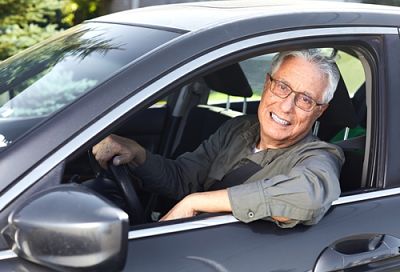
Older man smiling and hanging his arm out the window of a car
HOW OLD IS TOO OLD TO DRIVE?
Older Driver SafetyIf You are a Family Caregiver: Considerations before talking to an older driver
Getting older does not necessarily mean a person's driving days are over. But it's important to plan ahead and take steps to ensure the safety of your loved ones on the road.
If you think you need to have a conversation with an older driver about his or her driving abilities, remember that many older drivers look at driving as a form of independence. Bringing up the subject of their driving abilities can make some drivers defensive. So, be prepared with your observations and questions, and-if necessary-provide possible transportation alternatives.
Answering the following questions may help you decide if you need to initiate a conversation with an older driver about driving safely:
• Getting lost on routes that should be familiar?
• Noticing new dents or scratches to the vehicle?
• Receiving a ticket for a driving violation?
• Experiencing a near-miss or crash recently?
• Being advised to limit/stop driving due to a health reason?
• Overwhelmed by road signs and markings while driving?
• Taking any medication that might affect driving safely?
• Speeding or driving too slowly for no reason?
• Suffering from any illnesses that may affect driving skills?
If you answered "yes" to any of these questions, you might need to talk with your loved one about safe driving.
What You Can Do
If You are a Family Caregiver: Talking About Driving With an Older Driver
Talking with an older person about their driving is often difficult. Most of us delay that talk until the person's driving has become what we believe to be dangerous. At that point, conversations can be tense and awkward for everyone involved. But there are things you can say and do to make those conversations more productive and less tense. If you have decided to initiate a conversation with an older loved one about driving safely, take these three steps:
• Collect information
• Develop a plan of action
• Follow through on the plan.
If You are an Older Driver: Tips to Drive Safely While Aging Gracefully
Did you know? Some State departments of motor vehicles place restrictions on drivers once they reach a certain age. Find out whether your State defines "Older Drivers" at a certain age, and what that means for driver's license renewal and restrictions, including tests.
Decisions about your ability to drive should never be based on age alone. However, changes in vision, physical fitness and reflexes may cause safety concerns. By accurately assessing age-related changes, you can adjust your driving habits to remain safe on the road or choose other kinds of transportation.
If you've noticed changes in your vision, physical fitness, attention and reaction time, it's important to keep alert to how these changes may be affecting your ability to drive safely.
If you or someone you know is not sure about whether they should drive or not, contact your family physician or call the Sabetha Family Practice at (785) 284-2141 to discuss your options.
